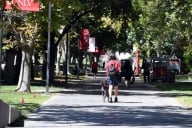You have /5 articles left.
Sign up for a free account or log in.
A federal appeals court on Tuesday said that San Diego State University had the right to enforce anti-bias rules when deciding whether to recognize religious student groups. At the same time the court found that there may be evidence that the university applied those rules inconsistently, which would be unconstitutional.
The ruling, by the U.S. Court of Appeals for the Ninth Circuit, builds upon and may in some ways extend a ruling last year by the U.S. Supreme Court upholding the anti-bias rules of the Hastings College of Law of the University of California, even when religious student groups said that those policies were inconsistent with their beliefs. The Hastings policy was what the courts have called an "all comers" policy -- to be recognized, a student group must let in all students who want to join. The ruling cleared the way for public colleges and universities to enforce such rules.
The policies at San Diego State are narrower, and permit student groups some rights to control their membership. However, San Diego State does require that recognized student groups not discriminate on certain bases, including race, gender, religion and sexual orientation.
The policy was challenged by a Christian sorority, Alpha Delta Chi, and a Christian fraternity, Alpha Gamma Omega. The sorority restricts membership to those who attend an evangelical church and who have a "personal acceptance of Jesus Christ as Savior and Lord." The fraternity requires members "to sincerely want to know Jesus Christ as their Lord and Savior." These and other requirements led San Diego State to reject the two groups' applications to be recognized as official student organizations since they openly discriminate on the basis of religion -- under a policy that the appeals court has now upheld.
The ruling could be significant well beyond San Diego State -- whether or not it is appealed. The Hastings policy that the Supreme Court upheld is but one form of an anti-bias rule. And while defenders of strong anti-bias rules were cheered by the Supreme Court's ruling, critics expressed hope that other kinds of anti-bias rules -- such as the one in place at San Diego State -- might not win court backing. Many public colleges and universities have policies like those of San Diego State.
The appeals court on Tuesday cited several factors in upholding the San Diego State rules. One test is "reasonableness" in light of an institution's overall educational goals. The appeals court here cited statements in San Diego State's student handbook that linked the anti-bias rules to goals of promoting diversity and inclusiveness -- and found those statements appropriately linked to the university's goals.
Another test applied by the appeals court, based on several prior court rulings, was whether the anti-bias rules have the impact of severely limiting the right of the religious groups to organize and express themselves. The appeals court noted that there are some privileges that San Diego State limits to recognized student groups. For instance, they can hold events throughout the campus, not just at selected locations. And recognized groups don't have to pay a fee to rent various rooms or facilities. But the appeals court found San Diego State's policy "reasonable" in that it allows non-recognized groups many places to set up tables, display leaflets and hold meetings.
Another challenge to the San Diego State policy -- and the area where the Christian organizations said that the Hastings ruling should not apply -- was over "viewpoint discrimination." In numerous rulings, federal courts have made clear that public universities must apply their rules without regard to the politics or beliefs of an organization. In this case, the Christian groups charge that San Diego State's policy favors secular beliefs because discrimination based on secular beliefs would be allowed, while discrimination based on religious beliefs is not. As the court ruling summarized the situation, "a student Republican organization could permissibly exclude Democrats because the policy does not forbid discrimination on the basis of political belief, but a Christian group could not exclude a Muslim student because that would discriminate on the basis of religious belief."
The ruling Tuesday found that while that argument was "seemingly compelling at first glance," it "does not survive closer scrutiny." The ruling explained: "We accept plaintiffs’ assertion that San Diego State’s nondiscrimination policy incidentally burdens groups that wish to exclude others on the basis of religion, but does not burden groups that do not exclude or exclude on bases not prohibited by the policy. But this assertion is insufficient to prove viewpoint discrimination, because plaintiffs have put forth no evidence that San Diego State implemented its nondiscrimination policy for the purpose of suppressing plaintiffs’ viewpoint, or indeed of restricting any sort of expression at all."
Noting that San Diego State asserts that its policy has the goal of promoting equity, the appeals court said that "[a]s the Supreme Court has made clear, anti-discrimination laws intended to ensure equal access to the benefits of society serve goals 'unrelated to the suppression of expression' and are neutral as to both content and viewpoint."
Further, the appeals court said that the rules at San Diego State do not impose its values on the Christian organizations in ways that limit their rights to free expression. "[T]here is a difference 'between policies that require action and those that withhold benefits,' " the appeals court decision said, citing earlier rulings.
"Plaintiffs are free to express any message they wish, and may include or exclude members on whatever basis they like; they simply cannot oblige the university to subsidize them as they do so," the decision added.
Potential Flaws in Application
In its ruling, the court noted that a policy may well be constitutional on its face, but may be legally challenged if it is being applied in unconstitutional ways. In this case, the appeals court found that the plaintiffs had presented some evidence that the university may not be applying the policy to all groups -- and said that a lower court should consider that evidence. For instance, the court cited evidence that the Catholic Newman Center, a recognized group, requires its leader to be in good standing with the Roman Catholic Church. And the African Student Drama Association requires its officers to be students from Africa.
It may be the case, the appeals court said, that such groups were approved by "administrative oversight." But the Christian groups are entitled to argue, the appeals court said, that this inconsistent enforcement is evidence of viewpoint discrimination against their values. That issue was sent back to a lower court to consider.
The ruling was 3-0, but one judge, Kenneth F. Ripple, wrote a concurring opinion in which he said that while precedent required him to vote with the majority, he was concerned about the impact of the ruling on religious student groups. He focused on the ability of secular groups, but not religious groups, to admit as members only those who share their beliefs.
"The net result of this selective policy is therefore to marginalize in the life of the institution those activities, practices and discourses that are religiously based. While those who espouse other causes may control their membership and come together for mutual support, others, including those exercising one of our most fundamental liberties -- the right to free exercise of one’s religion -- cannot, at least on equal terms," he wrote.
Jordan Lorence, a lawyer for the Alliance Defense Fund, which represented the Christian groups, told The San Francisco Chronicle that the organizations may appeal to the Supreme Court.
"A vegan group can exclude meat-eaters, and anti-death penalty groups can exclude people who don't support their cause" while receiving campus funding and other benefits, like access to meeting rooms, Lorence said. He said San Diego State's policy offers religious groups "second class status."








